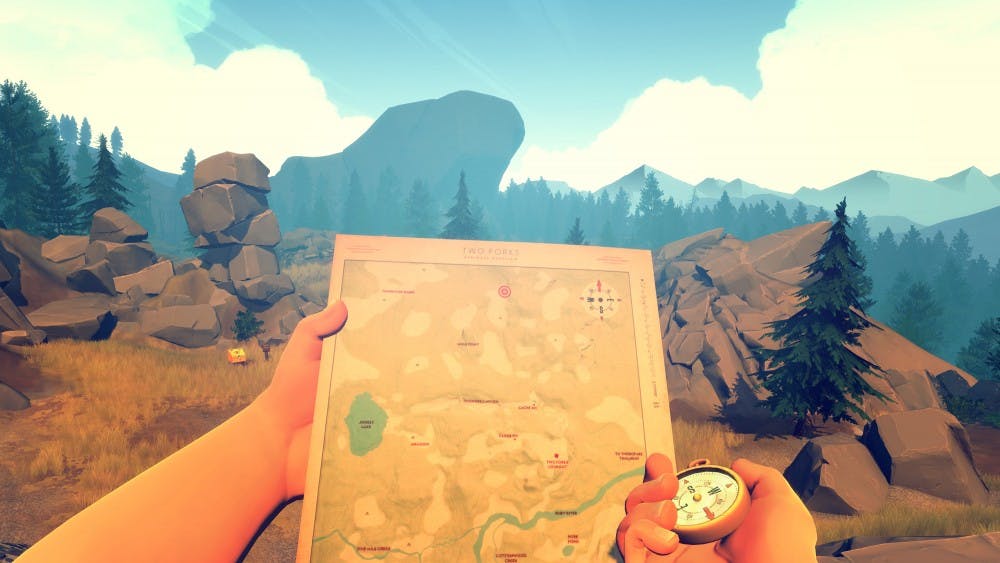
If video games could be reviewed solely on their art style, voice acting and storytelling, “Firewatch” — released on Feb. 9— would be one of my favorite games of this console generation, if not my favorite. Sadly, this isn’t the case. Although “Firewatch” does a great job with many aspects, I can’t help but feel slightly disappointed when I look back at the complete package.
In “Firewatch,” you play as a man named Henry who has found himself in a sad place in life and decides to take a job as a fire lookout in Wyoming’s Shoshone National Forest in order to escape from reality. Upon arriving to his watchtower, Henry is contacted by Delilah, a lookout in a nearby tower, who is the only person he has to talk to, including when things go wrong and a mystery arises.
As a narrative-centric game, “Firewatch” is light on gameplay, instead focusing its attention on storytelling. The gameplay primarily consists of using a map and compass to navigate around the forest. In the beginning I had to constantly resort to my map in order to avoid getting lost, but as the game went on, I started to recognize places and felt like I could navigate the terrain with more ease. While it gets a little repetitive, this mechanic does a good job of making the player feel the same as Henry, who is new to the forest and must learn how to hike across it.
It also helps that the landscape I was learning to navigate was stunningly beautiful. As I walked through the game’s colorful and picturesque world, I found myself acting like a real-life tourist in the actual Shoshone Forest, stopping every 100 yards to take in the view. The soundtrack is equally as beautiful. The way music would kick in at just the right moment in the story felt like watching a well-directed movie rather than a game.
The art style and graphics were superb, but the part of “Firewatch” that really resonated with me was the charming and honest dialogue between Henry and Delilah. With the help of tremendous voice acting from Rich Sommer as Henry and Cissy Jones as Delilah, the characters quickly became two of the most believable characters I have ever seen in a game. From the jokes they crack to the more serious aspects of their characters, they both have a level of depth and complexity that is unprecedented in gaming.
The dialogue is dictated by the player, who has the option to call in and talk to Delilah about various findings and is given multiple responses that steer the conversation in different directions. Because of the top-notch writing, this style of storytelling works wonderfully. I really felt a connection to Henry, so when he was faced with uncomfortable or stressful dialogue options, I reciprocated those feelings.
There is no doubt that with their first game ever, Campo Santo, the small new development team behind “Firewatch”, nailed it when it comes to how they told their story. However, the actual story itself is where some of the problems come. The best way I can describe the story's problems, without spoiling any of the game’s plot, is that “Firewatch” fails to see the full potential of the highly effective storytelling style it created.
Some of the plot decisions were more designed to fulfill the role of video games as art than they were to build an enjoyable experience for the player or to flow with previous story beats. Many of the turning points of the story are unexpected and nontraditional, but that doesn’t mean that they are enjoyable. While I like when developers try to push video game narratives to interesting new places, I believe that a clearer harmony between the game’s build up and its plot points would have served the game well.
While criticism of the game’s story is a more divisive issue, criticism of its performance, for the most part, is not. When playing on the PS4, I, and many others, often experienced frame rate issues that seemed to get worse as the game went on. Walking around and exploring is fun in “Firewatch,” but when the screen stutters for about 10 seconds every few minutes, it detracts from the experience. Because the game is only four hours long, the performance issues didn’t affect my playthrough too much, but had it been longer, this could have become a significant problem.
“Firewatch” is a difficult game to put a label on. Some are likely to love it, while others will have a hard time with some of the story choices. Either way, “Firewatch” bolsters incredible art style, direction, voice acting and writing that should be held as an example to developers of what games can be. The experience might feel brought down by certain story points, but Campo Santo’s debut game is still an important piece of art for the evolution of gaming as a medium.

